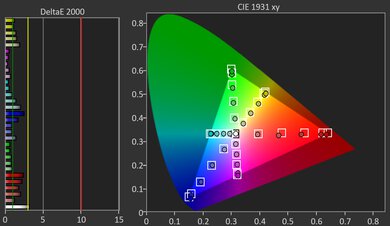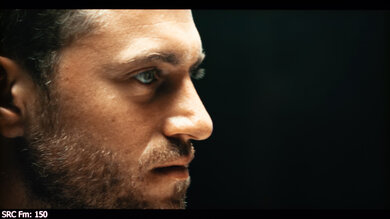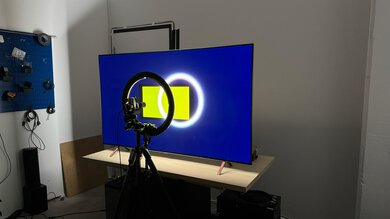
Although manufacturers don't focus on making their TVs only for sports, there are certain aspects of TVs that are important for a good experience while watching your favorite team play. Since a lot of sports are played during the day, you want a TV that has good enough brightness and reflection handling to overcome glare in bright rooms. You also don't want the fast action on your screen to look blurry, so it's important to have a TV with a quick enough response time. If you regularly watch sports with family or a group of friends, it really helps to have a TV with a wide viewing angle, so people seated to the sides of the screen don't see a drastically degraded image. We buy and test dozens of TVs each year, and through our rigorous testing procedures, we're able to see how each TV we test performs in regards to watching sports, and we use that data to determine what models we suggest people buy.
Below are our recommendations for the best TVs for sports to buy. See our picks for the best 4k TVs, the best budget TVs, and the best outdoor TVs, or vote on which ones you want us to buy and test. To learn more about the upcoming 2025 models, check out our 2025 TV lineup page.
-
Best TV For Watching Sports
Sports7.6Resolution 4kNative Refresh Rate144HzScreen FinishGlossyType OLEDSub-TypeQD-OLEDDolby VisionNoSizes 42" (WOLED) 48" (WOLED) 55" (QD-OLED) 65" (QD-OLED) 77" (QD-OLED) 83" (WOLED)The best TV for sports that we've tested is the Samsung S90D/S90DD OLED. It has an incredibly wide viewing angle, making it a perfect choice for watching the big game with a large group of friends in a wide seating arrangement, as everyone will have a good experience. Better yet, the TV has a near-instantaneous response time, so fast-moving players are crystal-clear, with no distracting motion blur behind them. It also displays an incredibly wide range of colors, but you will want to make sure you get one with a QD-OLED panel for the best possible image quality.
It has superb reflection handling, so you don't have to worry too much about glare on a sunny day. However, it's still not bright enough to overcome glare in rooms with all the curtains open. It upscales lower-resolution content well, which is great as most sporting events are broadcast at a lower resolution. If you don't have cable, the Tizen OS interface has a great selection of streaming apps, and you can easily find your favorite sports channels.
-
Best Bright Room TV For Watching Sports
Sports8.5Resolution 4kNative Refresh Rate120HzScreen FinishGlossyType LEDSub-TypeVADolby VisionYesSizes 65" 75" 85"If you're in a well-lit room, a premium TV with an LED backlight like the Sony BRAVIA 9 QLED is a better choice than the Samsung S90D/S90DD OLED, making it the best TV for watching sports in a bright room. Its superb reflection handling and SDR brightness means it easily overcomes glare in the brightest of rooms, so you aren't distracted by reflections on your screen while watching Sunday afternoon NFL games. The TV's image processing is excellent for upscaling and smoothing out low-quality content, which is great for watching sports from cable or low-quality streams. It's also very accurate with colors, so your favorite team's jerseys look the way they should.
Unfortunately, its viewing angle is mediocre. It's not the best option if you regularly watch sports with a big group of friends since the image degrades when viewed from the sides of the screen. However, the TV has a quick response time for minimal blur behind fast-moving players and objects. It uses the popular Google TV interface, which makes finding sports easy for those who don't have cable. It also has good speakers built-in, which is great for those without a soundbar.
-
Best Mid-Range TV For Watching Sports
Sports7.4Resolution 4kNative Refresh Rate120HzScreen FinishGlossyType OLEDSub-TypeWOLEDDolby VisionYesSizes 48" 55" 65" 77" 83"If you'd like an OLED but find the Samsung S90D/S90DD OLED too expensive, the LG B4 OLED is a great mid-range TV and can serve as an excellent entry point into the OLED market. The TV doesn't display the same range of colors as the S90D due to its WOLED panel, but colors are still vibrant and lifelike. However, it has equally as good upscaling capabilities, so you don't have to worry about a soft looking image when watching Sunday afternoon NFL games.
Like all OLEDs, it has a superbly wide viewing angle, so it's a great option for watching the big game with a group of friends. The TV also has a near-instantaneous response time, leading to a nearly blur-free viewing experience even when watching the most hectic sports. It has very accurate colors without needing calibration, meaning your favorite team's jersey looks the same as it does when you're at a live game. Finally, the TV comes with LG's webOS, which is loaded with apps, so it's great if you don't have cable and rely on streaming to watch sports.
-
Best Lower Mid-Range TV For Watching Sports
Sports7.8Resolution 4kNative Refresh Rate144HzScreen FinishGlossyType LEDSub-TypeVA (except 75")Dolby VisionYesSizes 55" 65" 75" 85"If you want high-end performance but don't want to spend high-end prices, or if you watch football in mostly bright rooms, check out the Hisense U7N. It's an impressive TV with a similar Mini LED backlight to the Sony BRAVIA 9 QLED; although it has fewer dimming zones, it isn't as bright, and its contrast isn't as good. Still, the TV has amazing reflection handling and SDR peak brightness, so it's no slouch in a bright room. It also looks great in a dark room due to its excellent contrast, so whether you have the lights on or off, you get great overall picture quality.
Unfortunately, it has a narrow viewing angle, so it's not great for watching the game with a large group of friends. However, it does have good upscaling and very good low-quality content smoothing, which helps make sports from cable or low-quality streams look good. It even has a fast response time, so there's minimal blur behind motion in faster sports. The TV's SDR accuracy is unremarkable, so if you care about having the most accurate colors possible, you will need to get it calibrated. Finally, finding sports to watch is very easy, thanks to the Google TV interface.
-
Best Budget TV For Watching Sports
Sports7.3Resolution 4kNative Refresh Rate60 HzScreen FinishSemi-glossType LEDSub-TypeVADolby VisionYesSizes 55" 65" 75" 85"The best budget TV for watching sports is the Hisense U6/U6N. It's a decent TV overall, with good picture quality. It has very good brightness in SDR, but its reflection handling isn't as good as it is on the Hisense U7N. It can fight some glare in a bright room, but it's better suited for a moderately lit environment. It looks its best in a dark room due to its fantastic contrast, so it's great for watching sports at night.
Like its bigger sibling, it's not a great option if you're looking for a TV to use in a large group setting due to its narrow viewing angle. The TV does a good job with upscaling, but it has poor low-quality content smoothing, so there are noticeable artifacts present when watching sports on cable or from low-bitrate streams. The TV also has poor color accuracy in SDR without calibration, so you might notice certain teams' jerseys looking a little bit different than they do in real life. Fortunately, it has an excellent response time for minimal blur behind fast-moving players and objects. Like most TVs on this list, it runs the easy-to-use Google TV interface.
-
Best Budget Sports TV For Wide Seating Areas
Sports5.7Resolution 4kNative Refresh Rate60HzScreen FinishGlossyType LEDSub-TypeIPSDolby VisionNoSizes 43" 50" 55" 65" 70" 75" 86"The LG UT7570 is the best budget TV for watching sports if you have a wide seating area. Outside of the OLEDs, it has the widest viewing angle on this list, as all of its sizes use an IPS panel, which has a wider viewing angle than the VA panels used in the other LED options. It makes it a better choice for watching the big game with a large group of people, as you don't have to fight over the best spot in the house. The TV has good reflection handling, but it's not very bright, so you will want to avoid placing it in a room with a lot of lights on.
Its response time is only decent, so you do see some blur behind very fast-moving players. It also doesn't display the same wide range of colors as other TVs on this list. Fortunately, it has decent overall image processing, so content from cable boxes looks fine. Like the LG B4 OLED, it runs the easy-to-use webOS, so you will have no problem finding your favorite team's big game. It's available in a wide variety of sizes, so whether you need a small 43-inch model or a huge 86-inch one, you have options.
Notable Mentions
- LG G4 OLED:
The LG G4 OLED has very high SDR peak brightness for an OLED TV. Its fantastic reflection handling and superb response time make it a great TV for watching sports. Unfortunately, it's also significantly more expensive than any other OLED on this list, so it's not a great value overall.
See our review - LG C4 OLED:
The LG C4 OLED is an amazing TV and one of the best upper mid-range TVs you can buy. Still, the Samsung S90D/S90DD OLED is a bit better due to its slightly wider viewing angle and better colors, and while the C4 has its strengths, sports don't really take advantage of them.
See our review - Hisense U8/U8N:
The Hisense U8/U8N is a much cheaper alternative to the Sony BRAVIA 9 QLED. It's an incredibly bright TV that easily overcomes glare in well-lit rooms. Still, the Sony has better contrast, image processing, accuracy, and a wider viewing angle, making it the better overall TV for watching sports.
See our review - TCL QM7/QM751G QLED:
The TCL QM7/QM751G QLED is a good TV for watching sports due to its impressive brightness. Still, the Hisense U7N is a better TV overall, with more accurate colors, superior contrast, and better reflection handling.
See our review - Hisense A6N [A6, A65N]:
The Hisense A6N is a solid alternative to the LG UT7570. The Hisense is brighter, but the LG has better reflection handling, so they perform similarly in a room with the lights on. The Hisense has the edge with colors, but the LG has a quicker response time, does a better job cleaning up low-quality broadcasts, and it's much easier to find in stock, making it the better option overall.
See our review
Recent Updates
-
We confirmed the availability of our current picks and added the Hisense A6N to the Notable Mentions.
-
We replaced the Samsung S90C OLED and the LG B3 OLED with their 2024 successors. We also replaced the Sony X80K/X80CK with the LG UT7570 in the 'Best Budget Sports TV For Wide Seating Areas' category and refreshed the Introduction and Notable Mentions sections.
-
Aug 08, 2024 : Replaced the Sony X93L/X93CL with the Sony BRAVIA 9 QLED in the 'Best Bright Room TV For Watching Sports,' the Sony A75L OLED with the LG B3 OLED in the 'Best Mid-Range TV For Watching Sports,' the Hisense U7K with the Hisense U7N in the 'Best Lower Mid-Range TV For Watching Sports,' and the Hisense U6/U6K with the Hisense U6/U6N in the 'Best Budget TV For Watching Sports' categories, respectively.
-
May 22, 2024 : Added mentions of the 2024 Hisense U6N, Hisense U7N, and Samsung S90D/S90DD OLED in the 'Best Budget TV For Watching Sports,' 'Best Lower Mid-Range TV For Watching Sports,' and 'Best TV For Watching Sports' categories, respectively.
-
Mar 26, 2024 : Replaced some pictures with more relevant ones and updated the text in the Notable Mentions section to better compare those with our current picks.
All Reviews
Our recommendations above are what we think are currently the best TVs to watch sports for most people in each price range. We factor in the price (a cheaper TV wins over a pricier one if the difference isn't worth it), feedback from our visitors, and availability (no TVs that are difficult to find or almost out of stock everywhere).
If you would like to do the work of choosing yourself, here is the list of all our reviews of TVs. Be careful not to get too caught up in the details. While no TV is perfect, most TVs are great enough to please almost everyone, and the differences are often not noticeable unless you really look for them.
Comments
Best TVs For Watching Sports: Main Discussion
What do you think of our picks? Let us know below.
Looking for a personalized buying recommendation from the RTINGS.com experts? Insiders have direct access to buying advice on our insider forum.
- 21010
TY RTINGS is the best!! I have mine at 54 and it looks nice! So lower brightness means more longevity out of my TV, more than likely correct? Does high contrast do anything in that regards?
Lowering the brightness of your TV might extend it’s life, but there are lots of other possible failure points that could still cause problems down the road, and there’s not much you can do about it. The contrast setting is a picture processing setting, it simply adjusts how the TV processes the incoming image, it doesn’t change anything on the panel itself, so this won’t extend your TV’s life at all.
- 21010
The setting to control the backlight intensity on this TV is called Panel Brightness, not ‘backlight’. You have to go in to the picture settings menu, then brightness, then you’ll see the setting mentioned, as shown here. Tap test isn’t definitive, no. If you have a phone with a decent camera you can usually get a decent enough photo of the subpixels, that’s the best way to determine if it’s IPS or VA.
TY RTINGS is the best!! I have mine at 54 and it looks nice! So lower brightness means more longevity out of my TV, more than likely correct? Does high contrast do anything in that regards?
- 32120
Just got this TV in 55". Pretty nice picture and black for cheap LED Can someone explain whey I have no “backlight” setting? Seems most LG I looked at did but this one does not, at least not in normal picture settings. Did the tested 65" have backlight? Also, if the “tap” test definitive when testing to see if I have a VA or IPS panel?
The setting to control the backlight intensity on this TV is called Panel Brightness, not ‘backlight’. You have to go in to the picture settings menu, then brightness, then you’ll see the setting mentioned, as shown here.
Tap test isn’t definitive, no. If you have a phone with a decent camera you can usually get a decent enough photo of the subpixels, that’s the best way to determine if it’s IPS or VA.
- 21010
Just got this TV in 55". Pretty nice picture and black for cheap LED
Can someone explain whey I have no “backlight” setting? Seems most LG I looked at did but this one does not, at least not in normal picture settings.
Did the tested 65" have backlight?
Also, if the “tap” test definitive when testing to see if I have a VA or IPS panel?
- 21010
Hi Rtings. We are looking at a 55UR8000AUA at Costco and Samsung did confirm it and the 65” are Va panels so that’s great but had a question. We watch LOTS of old TV show DVD’s and worry the 5.5 “upscale” score will be terrible for us. Would the 55” be better than 65” for this? Our last TV you have a score of 7 on upscale and it was great TY keep up the wonderful work!!
Our old upscaling test isn’t comparable at all to the new sharpness processing one, so your old TV’s score of 7 isn’t measuring the same thing as the new test. Unfortunately, yes, watching DVDs will look pretty bad on either of these TVs. The 55" would likely look slightly better, not because it has better processing, but because it’s a smaller panel, so the upscaling artifacts won’t be as noticeable.
There’s one big caveat to the above, though: it will depend on what you’re using to watch those DVDs. Many recent disc players have built-in upscaling, so depending on the quality of your player this may or may not be as much of an issue.
- 32120
Hi Rtings. We are looking at a 55UR8000AUA at Costco and Samsung did confirm it and the 65” are Va panels so that’s great but had a question. We watch LOTS of old TV show DVD’s and worry the 5.5 “upscale” score will be terrible for us. Would the 55” be better than 65” for this? Our last TV you have a score of 7 on upscale and it was great
TY keep up the wonderful work!!
- 21010
I think I already answered you on twitter, but answering here for visibility. We can only confirm for the 65", which is definitely VA. For the 55" and other sizes, we don’t know for sure as LG has been mixing panel types on these models. The only way we could confirm it would be to buy one.
Thanks RTINGS is the best!!
- 32120
RTING can you 100% confirm 65" and or 55" are VA panels? Need to know for a purchase
I think I already answered you on twitter, but answering here for visibility. We can only confirm for the 65", which is definitely VA. For the 55" and other sizes, we don’t know for sure as LG has been mixing panel types on these models. The only way we could confirm it would be to buy one.












![Hisense U7N [U7, U75N] Design Picture](https://i.rtings.com/assets/products/VNHIW7eU/hisense-u7n-u7-u75n/design-small.jpg?format=auto)
![Hisense U7N [U7, U75N] In-Test Picture](https://i.rtings.com/assets/products/dRAQg3kh/hisense-u7n-u7-u75n/in-test-small.jpg?format=auto)
![Hisense U7N [U7, U75N] Pre Color Picture](https://i.rtings.com/assets/products/JZcTrv01/hisense-u7n-u7-u75n/pre-colorspace-small.jpg?format=auto)
![Hisense U7N [U7, U75N] Low-Quality Content Smoothing Picture](https://i.rtings.com/assets/products/Y3OZT5Ws/hisense-u7n-u7-u75n/lq-smoothing-small.jpg?format=auto)





![LG UT7570 [UT75, UT7590] Design Picture](https://i.rtings.com/assets/products/swIH6vQi/lg-ut7570-ut75-ut7590/design-small.jpg?format=auto)
![LG UT7570 [UT75, UT7590] In-Test Picture](https://i.rtings.com/assets/products/sUsI35rr/lg-ut7570-ut75-ut7590/in-test-small.jpg?format=auto)
![LG UT7570 [UT75, UT7590] Pre Color Picture](https://i.rtings.com/assets/products/b0oOQM8g/lg-ut7570-ut75-ut7590/pre-colorspace-small.jpg?format=auto)
![LG UT7570 [UT75, UT7590] Low-Quality Content Smoothing Picture](https://i.rtings.com/assets/products/ls42nWC9/lg-ut7570-ut75-ut7590/lq-smoothing-small.jpg?format=auto)














































